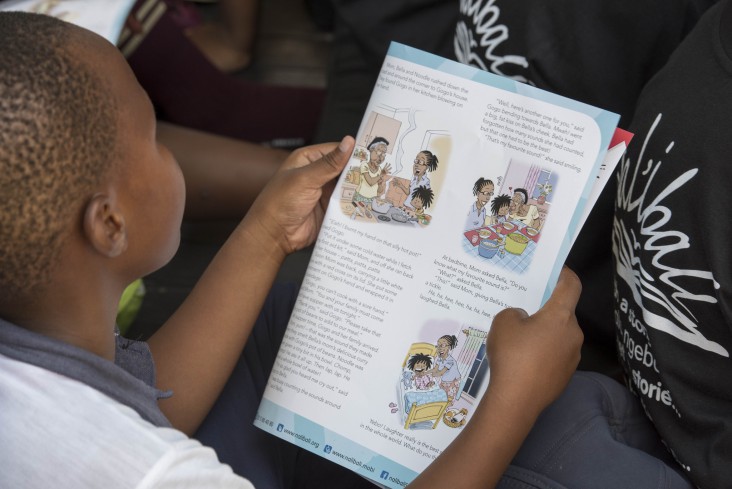
Nalibali Story Powered Schools
For Immediate Release
Nal’ibali, the national reading-for-enjoyment campaign, has partnered with United States Agency for International Development (USAID) to bring the campaign’s proven approach to literacy development to selected rural schools in the Eastern Cape and KwaZulu-Natal provinces. Focussing on nurturing a love of reading for joy in English and home languages to spark children’s potential and unlock their school learning, the schools’ initiative, titled: ‘Story Powered Schools: A South African Reading Revolution’, is launching with the new school year this January.
The Nal’ibali campaign is built on the simple logic that a well-established culture of reading can be a real game-changer for education in South Africa: “Indeed, research has shown a direct link between reading for pleasure and children’s school success. We’ve seen evidence of this in the 1120 reading clubs we work with across the country and are excited to be putting stories into the hearts of the classrooms that need them most,” says Jade Jacobsohn, Managing Director at Nal’ibali.
In South Africa, the majority of children are not reading well. Close to one third of children lack the literacy skills needed for daily living and school learning. With most of these children living in rural areas, the Story Powered Schools drive will not only show these children new ways to experience books and stories, but demonstrate to educators how motivation, confidence, writing and linking language to children’s real-life experiences through reading for pleasure, can support curriculum objectives and increase children’s literacy development and school success. Ultimately, better enabling them to one day enter the workforce.
Endorsed by the Department of Education and embedded in the broader Nal’ibali campaign, the project will work with a total of 720 primary schools over a three-year period. Through a series of special trainings, regular site visits and mentorship, as well as the provision of books, stories and other literacy materials in home languages as well as English, school staff and community volunteers will be supported in bringing the compulsory reading period and literacy time included in the curriculum to life for children in Grade R – 4 classrooms.
Broadening the project’s reach, these adults will be further assisted in establishing after-school reading clubs to allow children from other grades to enjoy reading activities and reap the benefits of these too. Additionally, schools and their surrounding communities will be encouraged to participate in special literacy events and competitions run by the Story Powered Schools drive and supported by Nal’ibali at national and provincial levels each year.
“Nal’ibali is a growing wave of adults and children joining in to enjoy the power and magic of stories,” says Jacobsohn, noting the significant emotional and social benefits that reading and sharing stories with children can also have.
And, the schools’ initiative is poised to spread this special story power: Estimated at training 14 640 adults, co-creating 2 160 reading clubs, directly reaching 172 000 children through classroom-based activity and indirectly reaching 200 000 children through events and the presence of supportive, informed and committed adults and teachers in their lives; the intention is to keep growing a nation of empowered, literate citizens across South Africa.
Story Powered Schools is a Nal’ibali initiative endorsed by the Department of Basic Education and made possible by the United States Agency for International Development (USAID). Story Powered Schools aims to spark learners’ potential and unlock their school success through reading and storytelling by placing stories at the heart of classrooms and schools. For more information about the campaign or the power of reading and storytelling, visit: www.nalibali.org and www.nalibali.mobi.
-Ends-







Comment
Make a general inquiry or suggest an improvement.